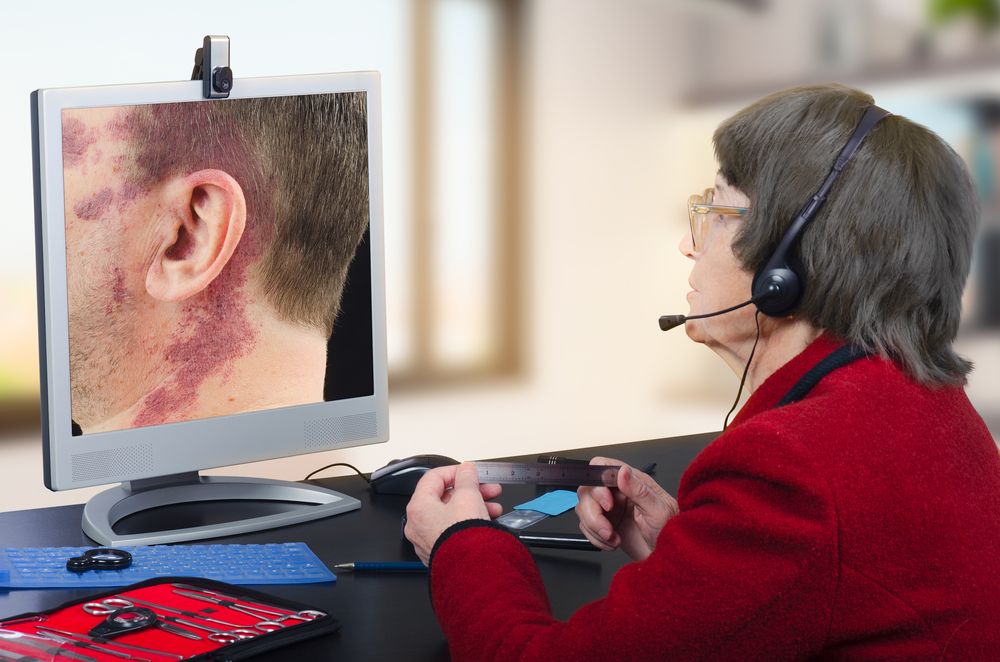- Case-Based Roundtable
- General Dermatology
- Eczema
- Chronic Hand Eczema
- Alopecia
- Aesthetics
- Vitiligo
- COVID-19
- Actinic Keratosis
- Precision Medicine and Biologics
- Rare Disease
- Wound Care
- Rosacea
- Psoriasis
- Psoriatic Arthritis
- Atopic Dermatitis
- Melasma
- NP and PA
- Skin Cancer
- Hidradenitis Suppurativa
- Drug Watch
- Pigmentary Disorders
- Acne
- Pediatric Dermatology
- Practice Management
- Prurigo Nodularis
- Buy-and-Bill
Publication
Article
Dermatology Times
What are my liabilities with telemedicine?
Author(s):
Teledermatology can be a major part of some dermatology practices. In this Legal Eagle article, Dr. Goldberg discusses the liability issues surrounding telemedicine that could put you and your practice at risk.
Teledermatology can be practiced in the role of a consultant or as a seeker of consultation. However, this practice, despite being a major part of some dermatology practices, now, is fraught with liability issues. (©Verbaska/Shutterstock.com)

Dr. Goldberg

Dr. TM, a practicing dermatologist in Florida, has spent the last several years looking for new revenue sources. He has a very active interactive website and is also active on a variety of social media sites. Because of this, he receives hundreds of questions from potential patients all over the country.
Before he began to charge for email consults, he received a photo four years ago from an individual in Oregon with a classic blue nevus. He told the patient the lesion was nothing to worry about. It turned out he was wrong. The patient had a rare malignant blue nevus and died from metastatic malignant melanoma 18 months later. Ultimately the deceased patient’s estate sues for negligence, wrongful death and practicing telemedicine without a license in Oregon. Dr. TM is beyond distraught and seeks legal advice. Should he be worried?
RELATED READING: Settlement or litigation: What should I do?
The term “telemedicine” covers any use of electronic communication technology to convey medical information. It can be as basic as seeking a consultation or as advanced as robotic surgery. Teleradiologists and telepathologists use electronic communication to send radiographs and specimen images for diagnostic or consultation purposes. Teledermatology can be practiced in the role of a consultant or as a seeker of consultation. However, this practice, despite being a major part of some dermatology practices, now, is fraught with liability issues.
1. LICENSURE (i) Are you exceeding the license granted by your own state? If so, you can be subject to disciplinary action in your own state if you use your license inappropriately as a predicate to practice telemedicine. So you must determine if your state permits you to act as a telemedicine practitioner. (ii) Are you engaging in the unlicensed practice of medicine in other states? There is no national consensus on what states demand from physicians located outside their borders and are practicing telemedicine within any one state. Some states demand full licensure, some offer restricted licenses for telemedicine, and some offer licensing by endorsement under reciprocity agreements with neighboring states. Despite the wide range of options, there is a common thread to keep in mind: If there is a regular, ongoing practice of telemedicine in the state (as opposed to an occasional consultation), the state will want some degree of licensure. A physician who lacks such licensure can be subject to prosecution for the unlicensed practice of medicine.
2. INSURANCE COVERAGE (i) Most malpractice policies specifi cally exclude coverage for unlicensed activities. Some states require insurers to cover work that extends beyond state borders and some do not. Know where your state stands and obtain coverage in any state with patients aff ected by your consulting if you do not have that protection. (ii) Does your carrier cover you for telemedicine practice? Telemedicine consulting may not be covered by your malpractice insurer and you may need to obtain surplus lines coverage.
3. NEGLIGENCE LIABILITY (i) Can a medical malpractice action be brought in the setting of telemedicine? Yes. (ii) Where can the action be brought? The issue of “forum shopping” comes into play if the doctor provided the telemedicine service in a state diff erent from where the patient lives. Most jurisdictions will permit a resident to bring a lawsuit where the patient received care or where the defendant physician’s offi ce is located. Telemedicine obviously expands the scope of venue exposure. The plaintiff can bring the telemedicine consultant into a court in his state. A state may also require venue. For example, Montana and North Carolina both require that any medical malpractice claims by their residents that are based on telemedicine must be brought within their state. A physician who practices in a state with a short Statute of Limitations should not assume that time limit will apply if he is sued for telemedicine consult. Diff erent states also take different approaches to the Standard of Care. Some use a national standard and some use a local one. The consulting telemedicine physician should therefore become acquainted with the standards used in the states they extend their practice to.
In the end, Dr. TM is right to be concerned. The fact that he did not charge the now deceased patient will be no defense. Dermatologists need not fear adding teledermatology to their practices. They do need to understand the unique legal issues that may arise in the practice of teledermatology.







